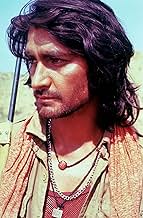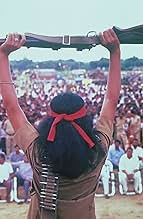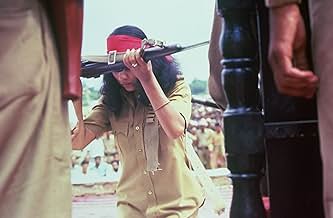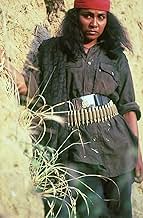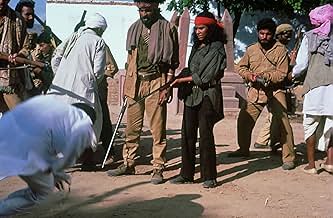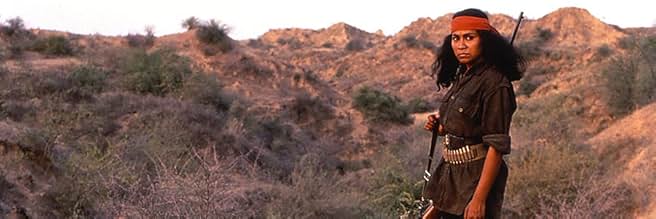AVALIAÇÃO DA IMDb
7,5/10
5,6 mil
SUA AVALIAÇÃO
A história da rainha do bandido Phoolan Devi que foi enviada para a prisão em 1983 e saiu em liberdade em 1994.A história da rainha do bandido Phoolan Devi que foi enviada para a prisão em 1983 e saiu em liberdade em 1994.A história da rainha do bandido Phoolan Devi que foi enviada para a prisão em 1983 e saiu em liberdade em 1994.
- Prêmios
- 4 vitórias e 4 indicações no total
Nirmal Pandey
- Vikram Mallah
- (as Nirmal Panday)
Raghubir Yadav
- Madho
- (as Raghuvir Yadav)
Manoj Bajpayee
- Man Singh
- (as Manoj Bajpai)
Ranjit Chowdhry
- Shiv Narain
- (as Ranjit Chaudhry)
Avaliações em destaque
This is a remarkable movie. "The Bandit Queen" is a powerful and repugnant portrayal of a modern real-life Indian outlaw, Phoolan Devi ("Goddess of Flowers"). The movie opens at the point at which the 11 year-old Phoolan is sold as a bride to a middle-aged man. The marital rape and abuse that follows drives her away and eventually, as an outcast, into a life of brigandage.
What I found most striking in this movie is that it does not portray the heroine merely as a "wronged woman" but as a woman with deep psychological problems -- to me she frequently appeared to be downright psychotic. There are several scenes of unbridled, I might say X-rated, violence in which Phoolan is seen to gradually wind up from anger to viciousness. In one of these scenes she beats her former husband with a rifle butt. It was -- and I think it was meant to be -- sickening.
"The Bandit Queen" was very controversial in India. It was widely thought to be Oscar material, though apparently did not make the list due to political infighting within the Indian movie-making community. It's well worth the viewing. But I only recommend it for people with strong stomachs. It's a true story (the real-life Phoolan Devi went on to marry above her caste and became the first Untouchable to serve in the Indian Parliament) but it's a story without a happy ending.
What I found most striking in this movie is that it does not portray the heroine merely as a "wronged woman" but as a woman with deep psychological problems -- to me she frequently appeared to be downright psychotic. There are several scenes of unbridled, I might say X-rated, violence in which Phoolan is seen to gradually wind up from anger to viciousness. In one of these scenes she beats her former husband with a rifle butt. It was -- and I think it was meant to be -- sickening.
"The Bandit Queen" was very controversial in India. It was widely thought to be Oscar material, though apparently did not make the list due to political infighting within the Indian movie-making community. It's well worth the viewing. But I only recommend it for people with strong stomachs. It's a true story (the real-life Phoolan Devi went on to marry above her caste and became the first Untouchable to serve in the Indian Parliament) but it's a story without a happy ending.
Phoolan Devi (played by Seema Biswas) is sold into marriage at 11 and is repeatedly abused from then onwards because she is a woman. She is partially liberated by Vikram Mallah (Nirmal Pandey), one of the bandits she is taken in by and eventually rises to lead the group, extracting vicious revenge on upper-cast men in repayment for what they had done to her.
The film is a fascinating account of the life of Phoolan Devi who was assassinated in September 2001. The film follows from rise (if you can call it that) from abused child to Bandit Queen. Scenes of abuse are tactfully portrayed with the focus on Phoolan's face rather than the act itself. This focus allows the viewer to see the pain that is inflicted by the abuse. This is still very hard to sit and watch be it the abuse by her husband at 11 or the gang rape of adulthood. It's sad that worldwide women are treated as second-class citizens, often subject to this type of terrible abuse as a matter of daily life - even sadder that many religions are interpreted to allow it.
Where the film is weak is the depiction of the two sets of violence - violence against Phoolan is shown as horrible and unforgivable as it should be, however her acts of retaliation are filmed with a more artistic camera and you get the feeling that we are meant to take it that these acts of violence are less horrible because they are revenge attacks. Many of those killed by Phoolan's gang had not done anything to her and were "innocent". The film should have a more even tone across all these actions.
The performances are roundly excellent. All characters no matter how repugnant or noble are played as totally believable - for many you see both sides of their characters. Seema Biswas is excellent as Phoolan Devi, she convinces throughout the film. The subject matter must have been very difficult to act through but she is without a flaw in the lead - the only problem being the slightly sympathetic edge towards her acts of revenge that the film gives.
The film is horrible viewing and yet inspiring that one woman could survive through such events in such a society. Phoolan lived with things that the vast majority of us will ever imagine, she rose up against amazing odds to marry above her caste and be elected to the Indian Parliament. Worth watching to help you be aware of the rest of the world and to ensure that you keep yourself kind towards others in all situations.
Long live Phoolan Devi. May she find more peace in death than she did in life.
The film is a fascinating account of the life of Phoolan Devi who was assassinated in September 2001. The film follows from rise (if you can call it that) from abused child to Bandit Queen. Scenes of abuse are tactfully portrayed with the focus on Phoolan's face rather than the act itself. This focus allows the viewer to see the pain that is inflicted by the abuse. This is still very hard to sit and watch be it the abuse by her husband at 11 or the gang rape of adulthood. It's sad that worldwide women are treated as second-class citizens, often subject to this type of terrible abuse as a matter of daily life - even sadder that many religions are interpreted to allow it.
Where the film is weak is the depiction of the two sets of violence - violence against Phoolan is shown as horrible and unforgivable as it should be, however her acts of retaliation are filmed with a more artistic camera and you get the feeling that we are meant to take it that these acts of violence are less horrible because they are revenge attacks. Many of those killed by Phoolan's gang had not done anything to her and were "innocent". The film should have a more even tone across all these actions.
The performances are roundly excellent. All characters no matter how repugnant or noble are played as totally believable - for many you see both sides of their characters. Seema Biswas is excellent as Phoolan Devi, she convinces throughout the film. The subject matter must have been very difficult to act through but she is without a flaw in the lead - the only problem being the slightly sympathetic edge towards her acts of revenge that the film gives.
The film is horrible viewing and yet inspiring that one woman could survive through such events in such a society. Phoolan lived with things that the vast majority of us will ever imagine, she rose up against amazing odds to marry above her caste and be elected to the Indian Parliament. Worth watching to help you be aware of the rest of the world and to ensure that you keep yourself kind towards others in all situations.
Long live Phoolan Devi. May she find more peace in death than she did in life.
10amzl
I saw this movie over 5 years ago and the subject still infuriates me, as it should. Her anger and initiative were inspiring. Not that I would takeover an army and kill people, but the scene at the well and at the rebel strong hold will never leave my mind. This is a great film but be prepared for the strong subject matter.
I saw Bandit Queen in 2005, over a decade after it was made amidst widespread controversy in India. The language, the stark treatment and the natural acting (by a relatively unknown cast for that time) might have been even more shocking at that time for an Indian populace more familiar with fantasy cinema. The film, the cast, and Shekhar Kapoor, deserve accolades for the breakthrough effort.
The plot is not very different from a typical revenge drama made in various forms in India. In fact, there have been several fictional accounts of this particular story itself. The reason why this stands out is that it's supposed to be a first person account of someone who actually went through all this, and a lot else that doesn't find place on the screen, and survived to tell the tale. Survived long enough to see her story made into a movie at least. Phoolan Devi didn't live very long after being released from prison in 1994.
The film scores on several counts. The cinematography is brilliant. The music is apt. The cast, many of whom became more familiar names later, is very good. But the screenplay is patchy. Things move too fast and in jerks at times. It's understandable though, because there are just too many strands that need to be tied together to make it all cohesive. Or maybe I felt that because I have read Mala Sen's book, which is a more detailed and better, though obviously not as shocking as the visual, account of Phoolan Devi's travails, and which is purported to be one of the main sources for the film.
There are some factual ambiguities too. According to Phoolan Devi, she wasn't present when the Behmai massacre took place, and despite claiming to be the dictated account of Phoolan herself, she is shown to participate, and in fact initiate, the massacre. Then the final scene where Phoolan surrenders shows her touching the feet of the Chief Minister, while in reality she had surrendered to a portrait of Mahatma Gandhi. Symbolic value only, but shows that Phoolan didn't want to show servitude to a living, ordinary person. It would have been nice to show the Chief Minister to have some resemblance to Arjun Singh, who many remember was the CM of Madhya Pradesh then.
But these are small chinks in this eminently well-made movie, a rare gem to come out from the mainstream Indian film industry, made by a man who before this was known best for the ultimate masala movie of the late 80s - Mr India.
The plot is not very different from a typical revenge drama made in various forms in India. In fact, there have been several fictional accounts of this particular story itself. The reason why this stands out is that it's supposed to be a first person account of someone who actually went through all this, and a lot else that doesn't find place on the screen, and survived to tell the tale. Survived long enough to see her story made into a movie at least. Phoolan Devi didn't live very long after being released from prison in 1994.
The film scores on several counts. The cinematography is brilliant. The music is apt. The cast, many of whom became more familiar names later, is very good. But the screenplay is patchy. Things move too fast and in jerks at times. It's understandable though, because there are just too many strands that need to be tied together to make it all cohesive. Or maybe I felt that because I have read Mala Sen's book, which is a more detailed and better, though obviously not as shocking as the visual, account of Phoolan Devi's travails, and which is purported to be one of the main sources for the film.
There are some factual ambiguities too. According to Phoolan Devi, she wasn't present when the Behmai massacre took place, and despite claiming to be the dictated account of Phoolan herself, she is shown to participate, and in fact initiate, the massacre. Then the final scene where Phoolan surrenders shows her touching the feet of the Chief Minister, while in reality she had surrendered to a portrait of Mahatma Gandhi. Symbolic value only, but shows that Phoolan didn't want to show servitude to a living, ordinary person. It would have been nice to show the Chief Minister to have some resemblance to Arjun Singh, who many remember was the CM of Madhya Pradesh then.
But these are small chinks in this eminently well-made movie, a rare gem to come out from the mainstream Indian film industry, made by a man who before this was known best for the ultimate masala movie of the late 80s - Mr India.
It may interest people to know that this film was made without any recourse to Phoolan Devi herself and, when she did finally see parts of it, was so enraged that she announced that the film was not to be shown in India or she would cover herself in petrol and set fire to herself. I do not know whether it was shown at all or not, but given her standing at the time as a rising politician, I doubt it. Since then, I saw a report that she has been ousted from office and charged with further crimes from her Dacoit days, and has gone into hiding as a result.
Her own concerns aside, this is an excellent film, made all the more so by its refreshingly brutal approach; none of the rose-tinted melodrama one might expect from a typical indian film. It should be stressed that concerns about how feminist the film's messages really are and the like are essentially irrelevant: it's a true story. Her misgivings are, it seems, not with what is depicted but with the way in which the film depicts her.
Her own concerns aside, this is an excellent film, made all the more so by its refreshingly brutal approach; none of the rose-tinted melodrama one might expect from a typical indian film. It should be stressed that concerns about how feminist the film's messages really are and the like are essentially irrelevant: it's a true story. Her misgivings are, it seems, not with what is depicted but with the way in which the film depicts her.
Você sabia?
- CuriosidadesThis was banned by the Indian authorities due to its graphic scenes of sex and violence. It also incurred the wrath of its own subject, Phoolan Devi, who objected to the fact that she hadn't been invited to see the film. Devi claimed it was riddled with inaccuracies.
- Citações
Puttilal: [Tied to a pole and beaten with rifle-butt] Forgive me.
Phoolan Devi: Forgive you?
Phoolan Devi: Write this to the police.
Vikram Mallah: What?
Phoolan Devi: Any man that marries a little girl... I'll kill him.
- Versões alternativasThe film became banned due to its content. It was later re-released theatrically and the CBFC cut out about 2 minutes of profanity and shortened all rape scenes for an 'A' (adults) rating in 1995. 17 minutes was cut for a U/A rating for television.
Principais escolhas
Faça login para avaliar e ver a lista de recomendações personalizadas
- How long is Bandit Queen?Fornecido pela Alexa
Detalhes
Bilheteria
- Faturamento bruto nos EUA e Canadá
- US$ 399.748
- Fim de semana de estreia nos EUA e Canadá
- US$ 34.728
- 2 de jul. de 1995
- Faturamento bruto mundial
- US$ 399.748
Contribua para esta página
Sugerir uma alteração ou adicionar conteúdo ausente


